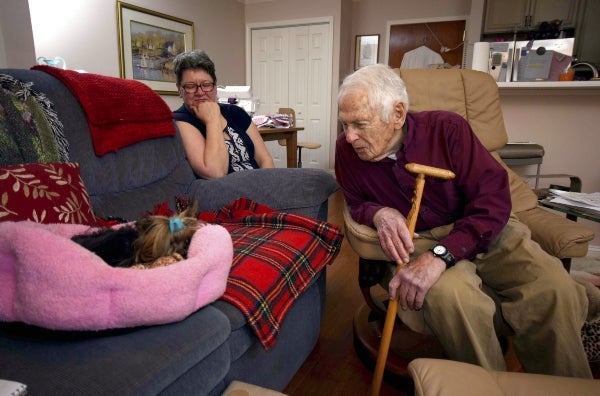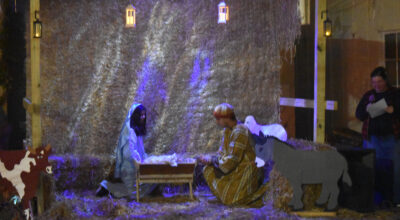Last of the builder brothers: Ralph Wagoner never stops learning
Published 12:10 am Sunday, March 6, 2016

- JON C. LAKEY / SALISBURY POST Ralph Wagoner enjoys the company of Pickle, his Yorkshire terrier that feels right at home in her doggie bed on the couch. GeoRene Jones, Wagoner’s caregiver, spends time with the pair at the apartment.
SALISBURY — Even though Ralph Wagoner will turn 100 this week, just last year he bought a new Toyota Prius.
You shouldn’t be surprised. His mother, Pearl, bought a new Cadillac when she was 100, and he remembers her proclaiming, “I’m going to run it until it wears out, and then I’ll buy another.”
“She was very much going to have her way,” Ralph says.
Back in December, Wagoner downsized from his longtime home on South Ellis Street and moved to the Trinity Oaks retirement community. He wakes up about 8 every morning, goes to the dining room for breakfast, then heads to the library to read three newspapers — the Salisbury Post, Charlotte Observer and New York Times.
He tackles the Times crossword every day, at least Monday through Thursday, and the “big one” after church on Sundays.
“Unless you have some time, you don’t want to do Friday,” Wagoner says, describing how the puzzles get tougher through the week.
At Trinity Oaks, Wagoner’s constant companions are caregiver GeoRene Jones and Pickle, his well-behaved, 4-pound Yorkie.
“She’s the best-known inmate in this asylum,” Wagoner says.
Ralph Wagoner is the last of the trio of Wagoner brothers — Ken, Ralph and Walt — who ran their family’s construction business during those good, old days when building had a difficult time keeping up with demand.
Noting he has been a man of leisure now for about 35 years, Ralph laughs, refers back to the retirement plan he set up for Wagoner Construction and says, “The insurance company has really lost money on me.”
Jane Gamewell, Ralph’s oldest daughter, says Pearl Wagoner had always wanted Ralph to be a teacher. A gold star graduate in engineering from The Citadel and a World War II veteran, Ralph has never lost a curiosity in the things around him.
“He absolutely loves to learn and continues to learn every day,” Gamewell says. “… He has an interest in a lot of things.”
Wagoner reads voraciously, preferring biographies on notable people and novels by writers such as John Grisham. He’s reading a biography on Jackie Kennedy now — “Jackie After Jack” — and he’ll tell you she wasn’t always the saint you might have thought she was.
In his working days, Ralph was fascinated with cameras and photography. He documented all the construction company’s projects on film, in addition to the lives of his children. Wagoner also brought the company into the computer age, and his interest in computers has never waned.
Wagoner has a Facebook page, depends on email for correspondence and keeps track of his personal finances on his computer.
“Sometimes he thinks he was born too soon,” Gamewell says.
Jones describes Wagoner as the most well-rounded person she has ever met, humble and “generous to a fault,” having put at least five non-family members through college.
Jones also mentions how curious Wagoner is and how often he will return to his room and commence a computer search on Google so he can find information on something new to him.
“He’s not afraid to say, ‘I don’t know.'” Jones says. “It doesn’t embarrass him.”
Lately, Wagoner has been taking a Spanish class at Trinity Oaks.
“I’m still interested in it because we’re going to have a lot of Spanish around here for a long time,” he says, “and it’s not really difficult.”
•••
E.W. and Pearl Wagoner had four sons and a daughter (Kathryn). The late Hubert Wagoner, the oldest son, fashioned a career in the Air Force, retiring as a chief warrant officer and choosing to live out his life in Denver, Colo.
Back in Salisbury, Ken, Ralph and Walt became the faces of E.W. Wagoner & Sons Construction (which evolved into Wagoner Construction) between the days of their father’s retirement in 1954 and Bill Wagoner’s (Walt’s son) purchase of the company in the mid 1980s.
Each brother had his specific area of expertise. Ken, who became president after his father, supervised the construction projects. As vice presidents, Walt handled the money end, and Ralph did the bidding and estimating.
“Each one of us let the other do his business,” Ralph says. “It was up to me to get a good price on it — low enough to win the bid and high enough to make a profit.”
Ralph describes Ken Wagoner as a self-educated man and “the most helpful person you have ever seen in your life.”
“If you did it his way,” Ralph says for clarification. “It was his way or the highway.”
Walt Wagoner was orderly, meticulous and “a people lover,” according to Ralph, “and people loved him, too.”
Walt Wagoner was by far the best dancer in Salisbury, his brother says. At social functions, women would constantly ask Walt to dance, “and he wouldn’t turn them down,” Ralph adds.
Of the three brothers in the construction business, Ralph says he might have been the one most open to trying new things. The company retirement plan, computer system and establishment of a ready-mix concrete plant behind the Wagoner Construction headquarters off West Innes Street were examples of things Ralph brought on line.
While Ralph was running the concrete plant, John Henderson started Power Curbers, which initially had a difficult time finding the right mixture of concrete to run through its curbing machines.
So the Wagoners and Power Curbers kept experimenting, constantly laying down test curbing in the backyard of the headquarters. The test curbing would be put down one day and torn up by a bulldozer the next so a new test could be run.
Ralph estimates they laid down curbing and tore it up 30 or 40 times until “finally, we got one that worked.”
•••
Wagoner Construction has its stamp on a multitude of local buildings too numerous to name. The renovated Meroney Theater, the restored Plaza on the Square, the former Holiday Inn, the parking garage at the hospital and the cottages at Trinity Oaks — all were built by Wagoner Construction.
The company’s other commercial and industrial buildings in North Carolina and elsewhere on the Eastern Seaboard encompassed hotels, parking garages, government and education centers, churches, athletic facilities, senior housing developments and banks.
Ralph Wagoner refuses to name his favorite Wagoner building. “I would say all of them, because none of them fell down,” he says.
Wagoner Construction once built hotels from Pennsylvania to Florida and particularly cashed in on the construction boom in Florida about the time Disney World was being built in Orlando. Good contractors found plenty of work in Florida then.
“There just weren’t enough contractors of any repute to take care of it,” Wagoner says of the building explosion.
Wagoner Construction built, for example, several retirement communities in the Tampa Bay-St. Petersburg area. The biggest was about 15 stories high, Ralph recalls.
•••
E.W. Wagoner founded his Salisbury-based construction company in 1918. At first, he worked out of his home on Mitchell Avenue and kept building supplies in his basement, but he eventually built offices behind an apartment building at the corner of Blair and Mitchell.
Pearl had the four boys rotate through chores, which included helping their father, doing housework, bringing in the wood, feeding the cow and chickens and taking care of the yard.
Ralph recalled having to keep the wood box full for Pearl’s woodstove. E.W. saved the ends of boards cut on his constructions sites and brought them home for fuel, though Pearl wasn’t a big fan of that fast-burning kindling.
By 1932, E.W Wagoner had put himself on a path to becoming one of the largest contractors in the area. Since its inception, his company had built 60 houses, 10 churches, four schools, two banks, 12 stores, three garages and buildings for the Rowan County Fair.
Ralph said his father’s nickname when he was younger was “Pepper,” and it reflected all the energy he had. He was industrious, and generous to people in need. At E.W.’s wake in 1964, many people approached Ralph with stories of how his father had helped them.
“He gave away money when he didn’t have much left,” Ralph says. “And he ran a good construction company.”
Ralph attended Boyden High when it was only 11 grades, and by age 16 he was enrolled at The Citadel. It was mostly Principal Jack Knox’s idea that he attend the prestigious military school in South Carolina.
In hindsight, though he did well academically, Wagoner thinks he left home too early.
“Anybody can make a good grade,” he says. “I would have been much better off socially if I had been older.”
Walt Wagoner followed Ralph to The Citadel a couple of years later, and they became the first set of brothers in the school’s history to be gold star cadets at the same time. Gold stars, placed on both collars, were awarded to cadets with semester averages of 90 percent or better in all subjects.
•••
Wagoner married Jane Norvell in 1937, and the couple had two daughters, Jane and Frances, by the time Ralph was called to active duty in 1942 during World War II.
Thanks to his training at The Citadel, he started out as a first lieutenant, graduated from advanced infantry school at Fort Benning, Ga., and would go on to train infantry troops in Oregon and Washington State, becoming a captain and part of the 382nd Regiment of the 96th Division, which fought in the Pacific.
Wagoner participated in the invasion of Leyte in the Philippines. He smiles recounting how he and his men arrived a good three or four days ahead of Gen. Douglas MacArthur, who garnered all the fanfare with his return.
Jane Gamewell says her father doesn’t talk a lot about his war experiences, though Wagoner describes how the embedded Japanese soldiers would scream insults at the American infantrymen all through the night.
One of the favorite things Wagoner heard the Japanese soldiers yell was, “To hell with Babe Ruth.”
Wagoner’s regiment commander eventually sent him home because of a combination of ailments, including a kidney stone and a bad case of jungle rot or dengue, an infectious tropical disease.
“The islands are not like the movies,” Wagoner says. “In those days, they were pretty crude.”
Wagoner ended up recuperating at several different hospitals before his honorable discharge in 1946 and going back to the construction business.
Outside of work, he became interested in local theater, helping to build stage scenery and serving as president of the Piedmont Players’ Board of Governors in 1969.
He had a rocky start as president. A new director the board had hired presented the list of productions for the year, and the governors became concerned, having never heard of a single one.
They were “too far out,” Wagoner says, and the board ended up firing the director. Wagoner visited the drama department at Catawba College and persuaded individual professors there to each put on a production, which led to a lot of competition among them.
“We had the best season we ever had,” Ralph says, “but that was luck.”
•••
Wagoner married and divorced twice. He was 50 and on his second marriage when his daughter Karen (who also goes by “Kaye” ) was born.
At the time, Wagoner recalls worrying he wouldn’t live long enough to see Kaye graduate from high school. He didn’t know then about the good genes he had inherited from Pearl, who almost made it to 104.
Kaye was well into her 40s until she gave birth to her only child.
“It’s just great to have a 5-year-old grandchild when you’re 100 years old,” Wagoner says, and he means it. “He is the most perfect little boy.”
Wagoner is quite proud of all eight of his grandchildren. He also has “eight or 10” great-grandchildren and two great-great grandchildren.
Back at his South Ellis Street house, Wagoner spent a lot of time in his woodshop. In retirement, he also was a tennis player, “though not a good one,” he says.
Until about five years ago, Wagoner walked a lot for exercise, often taking a hike from his home to the post office, which is a considerable distance roundtrip. Wagoner still moves well today and relies only on a wooden cane.
When he drives the Prius, he stays off the interstate.
His health overall is rather good. His most serious challenges in the past have included torn anterior cruciate ligaments in both knees, a knee replacement, rotator cuff surgery, a bowel obstruction and a resulting intestinal resection.
There also was a six-week period when he dealt with shingles, cellulitis and a kidney stone. “That was the only time I ever thought I wouldn’t make it,” he says.
Thanks to all he does to keep his mind sharp, Wagoner retains a rich knowledge of local history, especially of Chestnut Hill and Fulton Heights in their early days and places such as Rabon’s Grocery and Mrs. Rabon’s bakery, Peeler’s Drug Store and Haven Lutheran Church, which his parents helped in founding.
Trinity Oaks will have a birthday party for Wagoner Friday afternoon. Fair warning: He might be the smartest man in the room — or at least the most curious.
Contact Mark Wineka at 704-797-4263, or mark.wineka@salisburypost.com.





